【冷育平】高二必修5 unit4 making the news7
高中英语必修五unit4makingthenewswarmingupandreading
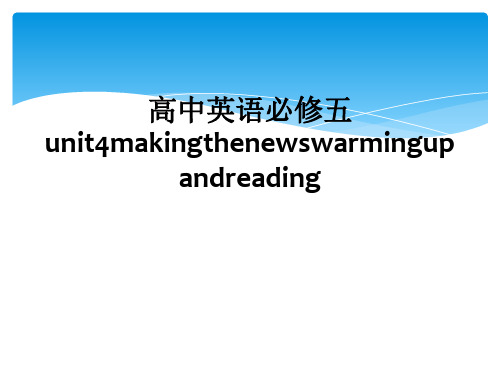
Photos are quickly developed .
Editors decide which picture should be used , read some stories and make any necessary changes
Editors write the headlines for each story and check that there is enough space.
A Editors check the facts B Designers design (lay out) the article C Reporters interview people or find out the
events D Photographers take photographs E Printers print the newspaper
Unit4 Making the news
Reading
My first work assignment “unforgettable〞 says new journalist
Newspapers are printed on fast – moving printing machines .
Newspapers are delivered by lorry and plane .
Newspapers are sent to every home .
How is a newspaper made?
Match the job and work involved
Reporter / Journalist
Checking the writing and facts and
高二英语必修五_unit4_making_the_news
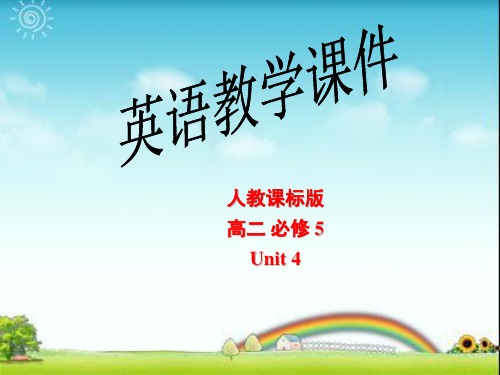
designers
lays out the article and photographs
printer
prints the newspaper
Types of jobs
What it involves
journalist
Interview people or finds out events from onlookers and writes news stories
Task 2 Scanning Decide if each of the following statements about Zhou Yang is true or false. If it is true, please find out a sentence from the passage to prove it.
□
□
8 Ability to work in a team
□
□
□
Look at the title and the picture. What do you think would make the first day at work “unforgettable”? • Doing things very special or meeting somebody very important • Feeling very strange and uncomfortable • Not dressed correctly for the job or dropping food or drink and feeling embarrassed
Guess the meaning of these expressions cover a story have a “nose” for a story a trick of the trade get the fact straight get the wrong end of the stick how the story goes a real “scoop”
最新人教版高中英语必修五Unit_4_Making_the_news_阅读精品ppt课件
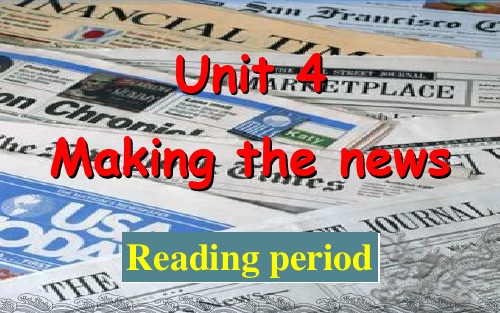
How to become a journalist _______ . Skills ◆ We need to be curious ◆ To acquire _______ all the information we
need to know, we have to ask questions many different _________ . ◆ To be a good nosereporter, we must have a “____ ” for a story. the truth ◆ telling When we find people are not ______________ , we must find story out the missing parts of the
making a newspaper?
reporter / journalist interviewer/interviewee
photographer
editor
designer
printer
READING
MY FIRST WORK ASSIGNMENT
“Unforgettable,” says new reporter
√
B. listen to a story D. report a story
√
有一个对新闻敏感的 “嗅觉” A. know what has happened. B. be able to “smell” the truth when somebody is telling part of it. C. be able to discover the whole truth by doing research. D. B and C
2023年book5 unit4 making the news全单元教案 (新课标版高二英语必修五
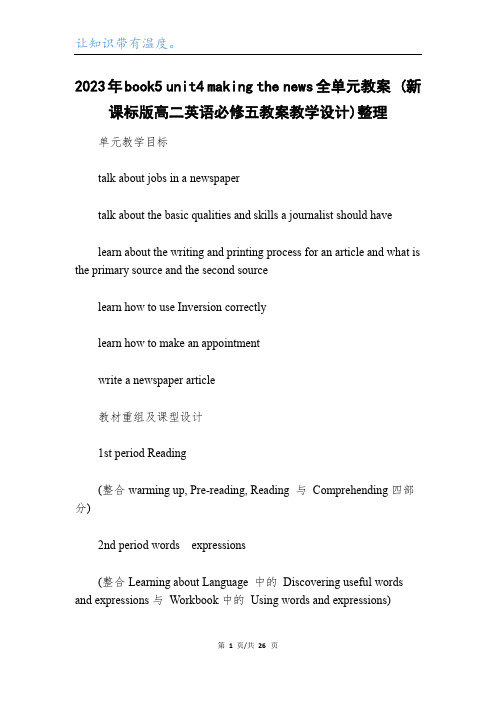
2023年book5 unit4 making the news全单元教案 (新课标版高二英语必修五教案教学设计)整理单元教学目标talk about jobs in a newspapertalk about the basic qualities and skills a journalist should havelearn about the writing and printing process for an article and what is the primary source and the second sourcelearn how to use Inversion correctlylearn how to make an appointmentwrite a newspaper article教材重组及课型设计1st period Reading(整合warming up, Pre-reading, Reading 与Comprehending四部分)2nd period words expressions(整合Learning about Language 中的Discovering useful words and expressions与Workbook中的Using words and expressions)3rd period Grammar(整合Learning about Language 中的Discovering Structures与Workbook中的Using Structures)4th period Extensive Reading(整合Using Language 中的Reading与Workbook中的Reading Task)5th 6th period Speaking and Writing ((整合Workbook中的SPEAKING TASK and WRITING TASK)7 th period Listening and Speaking(整合Using language 中的Listening and Speaking 与Workbook 中的Listening, Talking)The 1st Period Reading(整合warming up, Pre-reading, Reading 与Comprehending四部分)Teaching Aims:1.Enable the students to talk about the qualities needed to be a good reporter and how to conduct a good interview2. Enable the students to learn some reading strategies3. Enable the students to learn the necessary qualities in their futurejobImportant Points and difficult pointsLearn about how to be a good reporterTeaching methodsStrategic reading method; Task-based methodTeaching procedures:I. Elaboration (warming up): Help the students to relate their known knowledge to the topic that will be learnedTask 1 :( group discussion) Talk about jobs in China Daily?Types of jobs What it involvesreporterTask2: Predict what is going to be learned by looking at the title of the text. Which type of job will be talked about in the text?II. Prediction (pre-reading):Task 3: Predict the main idea of the text by discussing the following questions:1. What are the qualities a good news reporter needs to have?(Have group discussion first and then finish Part 1 individually)2. What your first day at school was like? How would you feel on your first day at work? (Group discussion)III. Skimming, scanning, analyzing (Reading Comprehending)Task 4: Read the text quickly to get a general idea of the text.Task 5: Divide the passage into three sections and match the following main ideas to the three sections:How to get an accurate storyHow to protect a story from accusationsHow to become a reporterThe skills neededThe importance of listeningStages in researching a storyHow to check factsHow to deal with accusations of printing liesWork in a teamTask 6 Read quickly to find out the information to fill in the formbelowTask 7: Tell what is required for a reporter and a photographerpatient; imaginative ; well-organized; technically good; polite; concise; thorough; creative; curious; careful; gifted; professionalA reporter A photographerIV. SummarizingTask 8: Write a summary of the textV. AssignmentRead an English newspaper and retell the main idea of one article in it.The 2nd Period Words ExpressionsTeaching Aims:Get the students to know how to use some words and expressions correctly and appropriatelyImportant Points and difficult pointsUse some words and expressions correctly and appropriatelyTeaching methodsDemonstrating and summarizing; practicingTeaching procedures:1. occupation n.1). Teaching is my occupation. 职业2). Swimming is my occupation. 使…劳碌的事情;消遣occupy v.occupied=busyoccupy oneself in/with sth.employment; occupation; job; profession; vocation; work; trade He is looking around for .: artistHe is out of .She chose teaching as her .She’s a lawyer by .He’s a carpenter by .2. assign v.assignment n.She gladly accepted the assignment. (分派的任务;工作) The English assignment is a book report. (课外作业,功课) 3. on one’s ownof one’s ownfor one’s ownWe should complete the test _________4. experienced adj.be experienced in/at sth/doing sth.Who is experienced in cooking in your home?5. The first/last time + 时间状语从句The first time I came here, I was not used to the climate here. Cover n. 封面,掩盖(物) ;v.1). Tom will covered the outbreak of the disease.2). The road was covered with snow.3). She laughed to cover her worry.4). The red army covered about 30 miles a day.5). Is the money enough to cover the cost of a new shirt?7. Be eager for sth. (sucess)to do sth.that clauseHe is eager to see his daughter.We are eager that the project should be started earlybe anxious about =be worried about8. Concentrate on sth./doing sth.We should concentrate on our study.Tom is concentrating on fishing.9. of +抽象名词(importance; value; use; help; benefit) of special interest=of no use=The meeting is of great importance.=Each minute is _____ for us.of greatly valuablegreat valuableof great valuefor much value10. acquire; get; gain1). I sat in the front of the bus to ___ _ a good view of the countryside.2). Gradually we _______ experience in how to do the work.3). They _____the victory after a bloody battle.11. have a nose for 嗅觉灵敏She has an ear for music. 有鉴赏力量She has an eye for color and style in clothes. 有眼光12. Meanwhile=in the meanwhile=in the meantime=at the same timeMother went shopping; meanwhile, I cleaned the house 13. trade n. v.1). Japan does lots of trade with the United States.2). He is a shoemaker by trade.3). She trades 3 apples for some bananas.14. Trick1). 窍门,手法2). play a trick(joke)on sb.=make fun of sb. (玩笑,恶作剧)3). He got into the building by a trick (阴谋,花招) 15. Challenge1).He challenge my view on that matter.2).To finish the job in 2 days was a real challenge.16. Supportn. 1).I need your support.v. 1)为…供应证据,证明2) The old man entered the room supported by his grandson.3). He has always supported the weaker party.4). He has a large family to support.17. Case1).He thought he had solved the problem , but that was not the case.2).Here is a case of being careless.3).We will look into that case.in case of sth. 假如,万一…in that/this case 在那样/这样状况下in no case 决不in case + 从句以防;可能;如果Take an umbrella in case it rains.(in case 从句常用一般现在时表将来, 或should+do)17. accuse sb. of sth.=charge sb. with sth.Tom ____ his boss of having broken his word. blamedaccusedchargedscolded18. so as to do sth. 只能在句末= in order to do sth.=so that + 从句= in order that + 从句I got up at five so as to catch the train=19. admitadmit doing /having doneadmit sb. Into/to (the university)Lily finally admitted___ my umbrella by mistake.to taketo have takenhaving takenhave taken20. n. adj.profession professional 具有….特点Finish Ex 3 on Page 29AssignmentFinish Ex1 and Ex 2 on Page 28 and Ex 3 on Page 29 (Discovering useful words and expressions)Finish Ex 2 , Ex3 on Page 63 and Ex4 on Page 64 (Using words and expressions) in Workbook.The 3rd Period GrammarTeaching Aims:Get the students to use “Inversion” correctly and appropriatelyImportant Points and difficult pointsUse “Inversion” correctly and appropriatelyTeaching methodsTask-based method; Demonstrating; discussion; summarizing; practicingTeaching procedures:I. PresentationTask 1: Comprehend the following sentencesOnly then did I begin my work on designing a new bridge.=I began my work on designing a new bridge only then.2. Not only was there a Christmas tree, but also exciting presents under it.=There was not only a Christmas tree, but also exciting presents under it.Inversion: 起强调作用II. Analyzing summarizingTask 2: Find 4 examples of inversion in the reading passage1. Never will Zhou Yang forget his first assignment at the office of China Daily.2. Only when you have seen what he or she does, can you cover a story by yourself.3. Not only am I interested in photography, but I took a course at university.4. Only if you ask many different questions will you acquire all the information you need to knowTask 3: Analyze the sentences above and summarize the rules1. Why can these sentences use inversion ?2. How are these inverted sentences made?※ 否定副词no;not;hardly, little, seldom, never, no sooner…than, no more, not only, only 等开头的句子要部分倒装。
人教版必修五Unit 4《Making the news》word教案

Unit 4 Making the news“Unforgettable”,says new journalistI.Teaching important points1.Let students talk about jobs in newspapers and what is needed to work in a newspaper office.2.Get students to read the passage and understand it.3.Have students learn different reading skills.II. Teaching difficult points1.Develop students’reading ability.2.Enable students to talk about what is needed to work in a newspaper office.III. Teaching aims and demandsLanguage aims:1.Get students to learn the useful new words and expressions in this part.2.Have students read the passage and know about zhouyang’first work assignment.Ability aims:1.Develop students’reading ability and let them learn different reading skills.2.Enable students to talk about jobs in newspapers and what is needed to work in a newspaper office.Emotional aims:1.Stimulate students’ interest in newspapers and the basic procedure of making the news.2.Develop students’sense of cooperative learning.Teaching aims:1.Enable the students to recognize the variety of jobs there are in newspapers and what is needed to work in a newspaper office.2.Enable the students to know what is needed to become a reporter and how to conduct an interviewee.3.Train the students’reading ability(skimming,detailed reading).Teaching procedure:Step 1.Lead-inThere are many kinds of occupations in the world, so which one do you want to choose? Step 2. Fast readingRead the text in 1 minute, and find out all the questions Zhou Yang asked.Step3.SkimmingRead and answer1.Where did the conversation happen?________________________________________________________________________ 2.Who were talking?________________________________________________________________________3.What does the reading passage mainly talk about? (a multiple choice)A.The skills necessary to become a good reporterB.The skills necessary to become a good photographerC.How to conduct a good interviewD.Being carefully in the new environmentE.A and CStep4.Careful readingWe can divide the passage into three parts according to the duties of a journalist.Part1.___________________________________________________________________ Part2.___________________________________________________________________ Part3.___________________________________________________________________ Part 1:(From the beginning to“Good”)1.When can a new journalist cover a story by himself?___________A. Never can a new journalist cover a story by himself.B. Only after he has seen what an experienced journalist does.C. Not until he is old enough .D. Only when he takes a camera with him.2.Zhou Yang took a course of photography at mid-school.(T/F)3.What a new journalist should do on the first day?(1). First he will be put as an assistant to an____________________________________(2).____________________________ him to take a________ with him. He will have a professional ____________ with him to take photographs.Part2.(From“What do I”to“support your story”)(1)While interviewing, the journalist would just ask the questions prepared in advance(预先).(T/F)(2)What a journalist needs to remember when going out to cover a story?a.He needs to be _________.b.A good journalist must have a good“_____”for a story.c.He has to listen for the _____________.d. If necessary, he can prepare a________ to make sure that he gets all the facts straight. Part 3 :(From “I see!”to the end)(1). The footballer admitted he took the money(T/F)(2).Zhou Yang is very eager to cover a story .(T/F)(3)The footballer was thought to be guilty because_______ .A. He usually told lies.B. He stopped the reporter publishing an article.C. He took money for deliberately not scoring goals so as to let the other team win.D. He bribed another football team.prehending(1)Zhou Yang’s notesSkills——◆We need to be _______ .◆To____all the information we need to know, we have to ask many different______ .◆To be a good reporter, we must have a “____ ”for a story.◆When we find people are not _______ , we must find out the missing parts of the ______ .Tips——Dos:◆______ to the answers carefully.Don’ts:◆Don’t be _____.◆Don’t talk too much ourselves.(2)Choose the correct explanation to the phrasesa.1 what do I need to remember when I go out to cover a story.( )A. tell a storyB. write storyC. send a storyD. report a storyb. A good journalist must have a good “nose”for a story.( )A. know what has happened.B.be able to “smell”the truth when somebody is telling part of it.C. be able to discover the whole truth by doing research.D. B and Cc. This is a trick of the trade.( )A. something that cheats somebodyB. something that helps you do the job in a professional way.C. something used to hide secrets.d.We sometimes use small recorders to make sure that we get all your facts straight.( )A. to make sure that the story is accurateB. to get the facts directlyC. to get the things speciallyStep 6.Post-reading——SummaryTo the journalists, there is no ______ for them to take a camera because they have professional ___________ with them. The journalists should be ________ and they must have a good _____ for a story. They know how to _______the information they need. While interviewing, they won’t be _____, they won’t_____ too much, and they ____ ___ the interviewee carefully. They will listen to the _______ facts and ask new questions. There is a trick of the _____, that is, with the permission of the interviewee, they would use a ________ which could keep the evidence to help __________their story.Step 7.Discussion(1)What is news?(2)Practice –interviewingStep 8.HomeworkFinish the exercise in«世纪金榜»P45 1,2,3.。
高二英语必修五《Unit 4 Making the news》教案
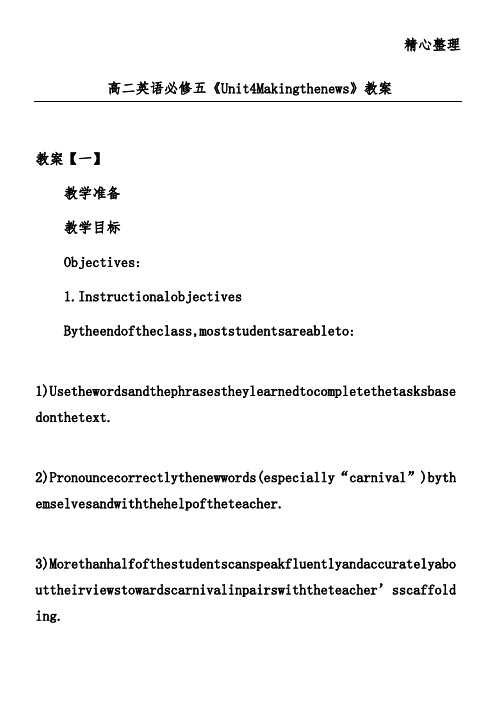
精心整理高二英语必修五《Unit4Makingthenews》教案教案【一】3)Morethanhalfofthestudentscanspeakfluentlyandaccuratelyabo uttheirviewstowardscarnivalinpairswiththeteacher’sscaffold ing.cationalobjectivesBytheendoftheclass,studentsareableto: Improvetheirculturalawarenessfromcarnivalandlearnmoreabouti1)Improvethemainreadingskillsthroughcompletingreadingtasksi npairworkandgroupwork.2)Usethetabletofinishtheiressayabouttheirfavoritefilm.Difficultpoints:Bytheendoftheclass,studentsareableto:1)speakfluentlyandaccuratelyabouttheirfavoritefilmsinpairswT:Today,let’scometoCultureCorner.Module4.DoyouknowChinesef estivals?Ss:…T:First,Workingroups,discussandmakealistofChinesefestivalsinEnglish.(1min).Ss:…T:OK,timeisup.YouknowChinesefestivals?Ss:…isbeautiful.Doyouknowforeignfestivals?Ss:...T:Inthetextbook,therearesomefestivalswithpictures.Doyouknowtherightdescriptionsaboutthem?Ss:...T:ThisfestivalisattheendofOctober,when“ghosts”comeout.T:Let’swatchavideo.Canyouguesswhatfestivalitis?.T:Theyaredressedupinspecialclothes,andtheyarewearmasks.Ss:...T:now,Firstquestionishowdopeoplefeelonthisfestival?Secondis whatfestivalisit?Ss:...T:Yes,verygood.Now,let’swatchavideoaboutCarnival.ions.Ss:..T:...Step2.Scanthepassageandtrytoanswerthequestions.T:Whatisthemeaningofcarnival?Ss:...T:Originallyitmeant“withnomeat”butnowitsymbolizes“life”.omechoneyouchoose?A.freedomB.harvestC.lifeitselfD.successSs:...T:YES,verygood.NextquestionisWeneedto_____tounderstandwhatc arnivalisallabout.A.lookatthehistoryofAmericaB.gotoAmericaSs:…T:Excellent,inparagraph2,thismarkedthebeginningoftheslavetr ade.Sothequestion1isFalse.T:nextquestion2,TheEuropeansimportedtheirfestivalsandlatert heslaveslearnedfromthemandaddedtheirtraditions.Ss:...,Task:Answerthequestionsaccordingtothepassage.T:Readthetextcarefullyandanswerthequestions.Next,wewillreadthetextagaintoexplorehowthetextorganized.3minutes,Let’sgo!T:Now,let’scheckyouranswers.Whatiscarnivaltoday?Ss:Carnivaltodayisaninternational,multiculturalexperience.4Didyoueatspecialfood?5Didyougiveorreceivegifts?6Didyouhaveaholidayfromschool?7Didyouenjoyyourselfwithyourfamilyorfriends?T:Iwilldividetheclassinto3studentsinagroup.3minutes,1,2,beg in!Ss:...Period1&2warmingupandreadingTeachingAims:1.Enablethestudentstotalkaboutthequalitiesneededtobeagoodre porterandhowtoconductagoodinterview2.Enablethestudentstolearnsomereadingstrategies3.Enablethestudentstolearnthenecessaryqualitiesintheirfutur ejobreporterTask2:Predictwhatisgoingtobelearnedbylookingatthetitleofthe text.Whichtypeofjobwillbetalkedaboutinthetext?II.Prediction(pre-reading):Task3:Predictthemainideaofthetextbydiscussingthefollowingqu estions:1.Whatarethequalitiesagoodnewsreporterneedstohave?HowtoprotectastoryfromaccusationsHowtobecomeareporterTheskillsneededTheimportanceoflisteningStagesinresearchingastoryHowtocheckfactsHowtodealwithaccusationsofprintingliesWorkinateamlV.AssignmentReadanEnglishnewspaperandretellthemainideaofonearticleinit.Period3&4Words&ExpressionsTeachingAims:Getthestudentstoknowhowtousesomewordsandexpressionscorrectl yandappropriatelyImportantPointsanddifficultpointsemployment;occupation;job;profession;vocation;work;trade Heislookingaroundfor.:artistHeisoutof.Shechoseteachingasher.She’salawyerby.He’sacarpenterby.beexperiencedin/atsth/doingsth. Whoisexperiencedincookinginyourhome?5.Thefirst/lasttime+时间状语从句ThefirsttimeIcamehere,Iwasnotusedtotheclimatehere.Covern.封面,掩盖(物);v.1).Tomwillcoveredtheoutbreakofthedisease.2).Theroadwascoveredwithsnow.8.Concentrateonsth./doingsth. Weshouldconcentrateonourstudy. Tomisconcentratingonfishing.9.of+抽象名词(importance;value;use;help;benefit)ofspecialinterest=ofnouse=Themeetingisofgreatimportance.=11.haveanosefor嗅觉灵敏Shehasanearformusic.有鉴赏能力Shehasaneyeforcolorandstyleinclothes.有眼光12.Meanwhile=inthemeanwhile=inthemeantime=atthesametimeMotherwentshopping;meanwhile,Icleanedthehouse 13.traden.v.1).Hechallengemyviewonthatmatter.2).Tofinishthejobin2dayswasarealchallenge. 16.Supportn.1).Ineedyoursupport.v.1)为…提供证据,证实2)Theoldmanenteredtheroomsupportedbyhisgrandson.3).Hehasalwayssupportedtheweakerparty.4).Hehasalargefamilytosupport.(incase从句常用一般现在时表将来,或should+do) 17.accusesb.ofsth.=chargesb.withsth.Tom____hisbossofhavingbrokenhisword.blamedaccusedchargedscoldedLilyfinallyadmitted___myumbrellabymistake. totaketohavetakenhavingtakenhavetaken20.n.adj.professionprofessional具有….特点FinishEx3onPage29ImportantPointsanddifficultpointsUse“Inversion”correctlyandappropriately TeachingmethodsTask-basedmethod;Demonstrating;discussion;summarizing;pract icingTeachingprocedures:I.Presentationit.Task2:Find4examplesofinversioninthereadingpassage1.NeverwillZhouYangforgethisfirstassignmentattheofficeofChi naDaily.2.Onlywhenyouhaveseenwhatheorshedoes,canyoucoverastorybyyou rself.词※部分倒装:只把谓语的一部分(如助动词\情态动词)等放到主语前,或把句子的强调部分提前。
人教版高中英语必修5教案Unit 4 Making the news
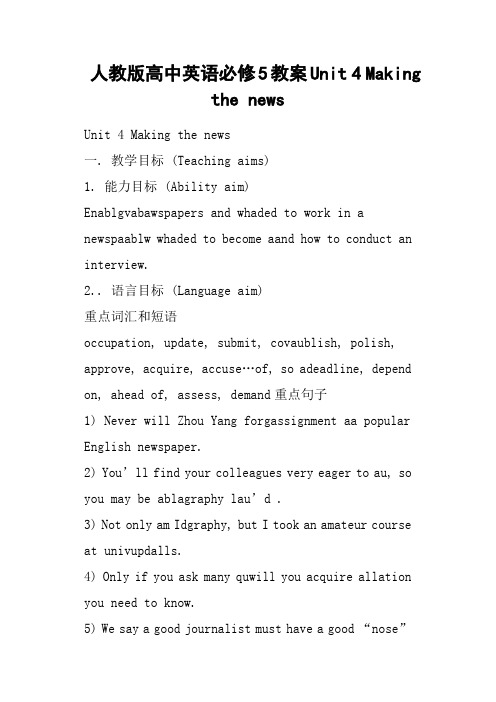
人教版高中英语必修5教案Unit 4 Makingthe newsUnit 4 Making the news一. 教学目标 (Teaching aims)1. 能力目标 (Ability aim)Enablgvabawspapers and whaded to work in a newspaablw whaded to become aand how to conduct an interview.2.. 语言目标 (Language aim)重点词汇和短语occupation, update, submit, covaublish, polish, approve, acquire, accuse…of, so adeadline, depend on, ahead of, assess, demand重点句子1) Never will Zhou Yang forgassignment aa popular English newspaper.2) You’ll find your colleagues very eager to au, so you may be ablagraphy lau’d .3) Not only am Idgraphy, but I took an amateur course at univupdalls.4) Only if you ask many quwill you acquire allation you need to know.5) We say a good journalist must hav e a good “nose”for a) Meanwhile you havaxt question depending on whaays.7) Have you ever had a case wbody accused yougetting the wrong end?8) Perhaps I too will get a scoop!Aids: Multimedia facilape-recorddiagrams二. 教学重难点 (Teaching importa)Know whaded to become aand how to conduct an interviewMauv三. 教学方法 (Teaching method)Fast reading; Task-based method discussion四. 教学步骤 (Teaching procedure)Period IStep I Warming up. ( see page 25 )Can you tellbs in a newspaany? What abs involves? TbsWhat it involvesReporter/ journalistInterview peoplds out evlPhotographerTaant people or eventsEditorMakes sure the writing is cleaand accuraactsDesignerLays out the articles and photographsPPwspaperTeaching suggestions: rearrangdbs a newspaper has and whavolveAnd auddo the matches. Then awhat’books.At the sadeal ww words:occupation and journalist and the ex: suu were…occupation =a jobTeachingupation. 教书是我的职业.。
高二英语必修5Unit4 Making the news 新课标 人教版 教案
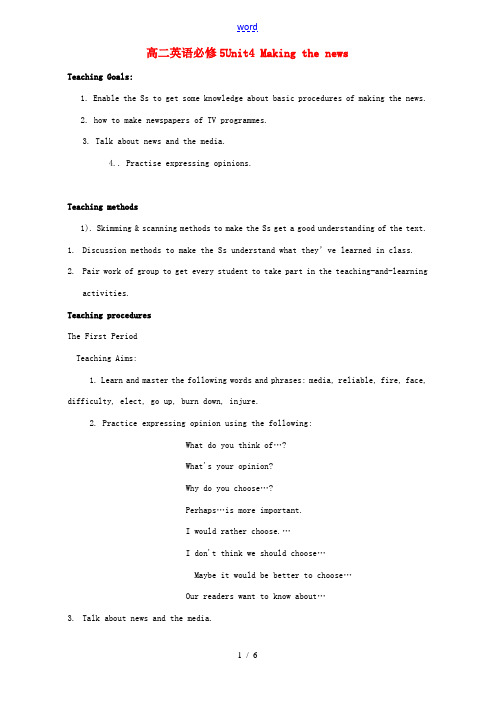
高二英语必修5Unit4 Making the newsTeaching Goals:1. Enable the Ss to get some knowledge about basic procedures of making the news.2. how to make newspapers of TV programmes.3. Talk about news and the media.4.. Practise expressing opinions.Teaching methods1). Skimming & scanning methods to make the Ss get a good understanding of the text.1.Discussion methods to make the Ss understand what they’ve learned in class.2.Pair work of group to get every student to take part in the teaching-and-learningactivities.Teaching proceduresThe First PeriodTeaching Aims:1. Learn and master the following words and phrases: media, reliable, fire, face, difficulty, elect, go up, burn down, injure.2. Practice expressing opinion using the following:W hat do you think of…?What's your opinion?Why do you choose…?Perhaps…is more important.I would rather choose.…I don't think we should choose…Maybe it would be better to choose…Our readers want to know about…3.Talk about news and the media.4. 4. Train the students' listening and speaking abilities.Teaching Important Points:1. Master the useful words and expressions appearing in this period.2. Train the students' listening and speaking abilities by talking about news and the media.Teaching Difficult Points:1. How to help the students understand the listening material exactly.2. How to help the students finish the task of speaking.Teaching Methods:1. Listening-and-answering activity to help the students go through the listening material.2. Individual, pair or group work to make the students finish each task.Step I Greetings and Lead-inT: Good morning/afternoon, class.Ss: Good morning/afternoon, Miss/ Mr. X.T: Sit down, please. Being the members of the society, we all cares for/about what happens around us or even what happens at home and abroad. How can you do so?Ss: By reading newspapers and magazines, watching TV programmes,listening to the radio.T: Are there any other ways? Think it over.Ss: By a website.T: Ye s. It’s also a way to learn about the world. What do you call these things which help us know about to the world?Ss:新闻媒体T: In English, we call it news media. First, let's learn the new words in this period. Look at the screen.(Teacher first asks some students to read the words on the screen. Correct the Ss' mistakes in pronunciation. Then teacher gives brief explanations. At last, let the Ss read and remember them for a while.)Step ⅡWarming up T: Well, now please open your books at Page 9. Warming up first. Look at each of the pictures and tell me which kind of news media it shows?Ss: The first picture shows a website; the second one shows radio; the third one shows TV programmes; the fourth one shows magazines; the fifth one shows newspapers.T: Quite right! Now, please work in groups of four and discuss the five questions below the pictures. A few minutes later, I’ll check your answers. OK?Ss: OK.T: You can begin now.(A few minutes later. )T: Are you ready now?Ss: Yes.T: Which group would like to talk about the first question? Choose one member of your group to answer the question.S1: I think TV is the most reliable among the news media. TV consists of a series of lively consecutive pictures. For the peoplewho want to know what is exactly happening, a picture responds better to offer the truth of a fact than the mere words upon a page. It can offer an unique function of seemingly on-the-spot feeling, which is not available to the othermedia.T: The second question?S2. I think TV programmes are easy for most people to understand. Radio, c an only be heard and sometimes can’t be picked up clearly. Newspapers and magazines are only useful for people who can read. Websites have many different pages, but you should be carefulto read some of the pages. who can read. Website have many different pages, but you should be careful to read some of the pages.T: The third question?S3 : I will check other sources.T: The fourth question?S4: Every morning, the newspaper chief editor and the journalists discuss the main events of the day. Reporters are then sent to cover the events. They usually do some interviews and then check the information. They must work very fast. Later in the day, everything is put together at the news desk. Then the editors read the stories and make any necessary changes and choose a good title for eachstory. At last, they print them quickly and deliver them. Making a magazine is more or less the same as making a newspaper. But the articles in a magazine are more like stories, which are writtenby all kinds of writers. Magazines are not published as quickly as newspapers.T: The last question?Ss: News broadcast, newspaper, magazine, radio programme, website,report, reporter, edito r, interview, write articles…Step Ⅲ Listening T: Next, let's e to the Listening. We are going to listen to two parts of conversations. The first part is an interview; the second part is a dialogue. Now, look at Exercise 1:Listen carefully towhat is said and tick the information you hear in each part. If necessary, I'll play it twice. (Teacher begins to play the tape, and checks the answers after listening. Then ask the students to finish the rest of the tasks. )T: OK. Now, please listen to each part once again and then work inpairs to talk about the questions in Exercises 2,3,4 and 5. Are youclear?Ss: Yes.(Teacher allows them enough time to talk about the questions. Thenask some students to say their answers.)Step IV SpeakingT:Well,now it's time for us to be the editors of a newspaper. Here is a list of ten things that happened today. Look at the screen. (Teacher shows the screen and read through the list to the whole class.)200 people died in an earthquake in Turkey.China beat Brazil 5-1 in football.France elected a new President.Three children from your city were killed.Someone robbed a bank in Shanghai.Food prices are going up.A house in your town burned down. Nobody was injured. 2 000 people in your city were happy today and moved into new buildings. A Chinese scientist has invented a new car engine that does not pollute the air. There is a rumor that a large pany wants to build a factory in your town:(Bb :go up, burn down)T: Now, you've known the ten things, but you only need to reportfive of them. So, first decide which events you are going to put in your newspaper. Then give reasons for your choices and pare with your classmates.Work in groups of four or five. And the following expressions on the screen can help you with your dialogue. After a while, I'll ask some of you to act out your dialogue.(Teacher shows the screen. )What do you think of'…?I would rather choose.…What's your opinion?I don't think we should choose…Why do you choose…Maybe it would be better to choose…Perhaps… is more important.Our readers want to know about….(Teacher goes around the Ss and checks their work. If necessary, teacher may join in them. )。
高二英语必修5 Unit4 Making the news的说课稿
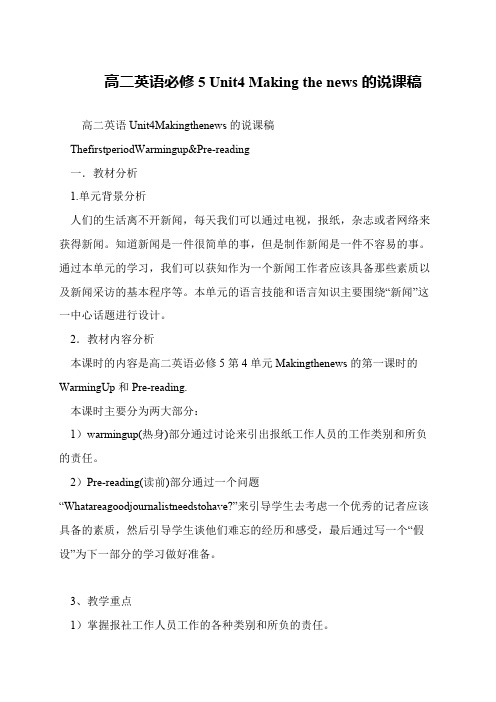
高二英语必修5 Unit4 Making the news的说课稿
高二英语Unit4Makingthenews的说课稿
ThefirstperiodWarmingup&Pre-reading
一.教材分析
1.单元背景分析
人们的生活离不开新闻,每天我们可以通过电视,报纸,杂志或者网络来获得新闻。
知道新闻是一件很简单的事,但是制作新闻是一件不容易的事。
通过本单元的学习,我们可以获知作为一个新闻工作者应该具备那些素质以及新闻采访的基本程序等。
本单元的语言技能和语言知识主要围绕“新闻”这一中心话题进行设计。
2.教材内容分析
本课时的内容是高二英语必修5第4单元Makingthenews的第一课时的WarmingUp和Pre-reading.
本课时主要分为两大部分:
1)warmingup(热身)部分通过讨论来引出报纸工作人员的工作类别和所负的责任。
2)Pre-reading(读前)部分通过一个问题“Whatareagoodjournalistneedstohave?”来引导学生去考虑一个优秀的记者应该具备的素质,然后引导学生谈他们难忘的经历和感受,最后通过写一个“假设”为下一部分的学习做好准备。
3、教学重点
1)掌握报社工作人员工作的各种类别和所负的责任。
必修五 4.2《Unit 4 Making the news》

Get the wrong end of the stick
Sth that helps you do the job in a professional way
Be able to “smell” when sb is trying to hide a good story .
An important story which your
newspaper gets ahead of all the
other newspaper
To have a “nose”
.
for a story
You do not understand what is being said .
A trick of the trade
• To protect a story from accusations (I can
see --- You never know!)
How to become a successful reporter?
go
The skills needed
① work in a team (work with colleagues) ② research a story (have a “nose” for a story) ③ be accurate (get all our facts straight) ④ protect a story from accusations
4
Photographers take
photographs (D)
Printer prints the newspaper (E)
How to make the newspaper ?
必修五 4.2《Unit 4 Making the news》
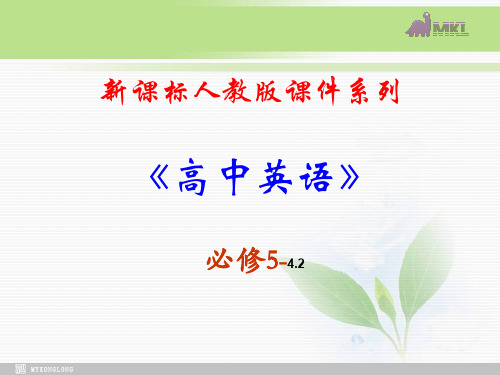
• Find out the truth • Prove oneself right
Paraphrase (explain English words and
phrases in English ) Cover a story
4
Photographers take
photographs (D)
Printer prints the newspaper (E)
How to make the newspaper ?
C
D
E
A
B
Step1/2 interview
Step 1/2 take photographs
Step 3 make sure the writing is clear
Stages in researching a story
①ask many questions (acquire all the information) ②note reactions (when people answer questions) ③check facts (tell when people are telling the truth) ④do research (discover the truth)
Step 4 lay out
Step 5 print the newspaper
What are the qualities a good news reporter needs to have?
• ①higher level of education • ②work experience • ③good communication skills • ④curious, active personality • ⑤hard-working • ⑥enthusiasm for the job • ⑦prepared to work long hours • ⑧ability to work in a team
高中英语新人教必修五_Unit4_Making_the_news单元教案新部编本
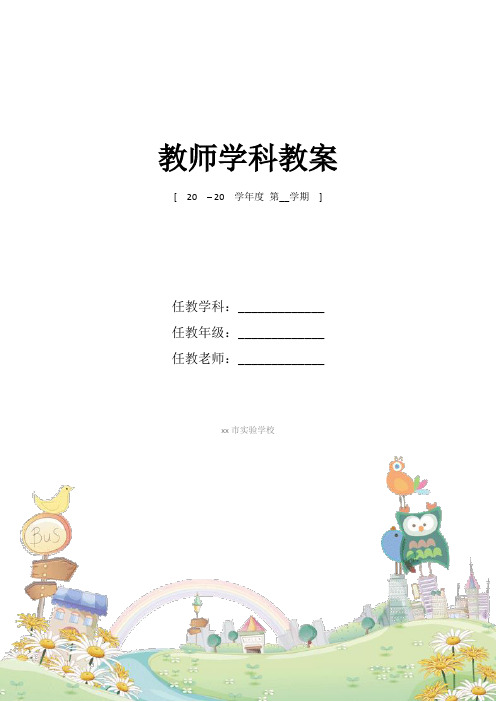
教师学科教案[ 20 – 20 学年度第__学期]任教学科:_____________任教年级:_____________任教老师:_____________xx市实验学校Unit 4 Making the newsⅢ. 教材分析与教材重组1. 教材分析本单元的中心话题是“新闻”,内容涉及新闻工作者应该具备的素质和新闻采访的基本程序等。
语言技能和语言知识主要围绕“新闻”这一中心话题进行设计。
1.1 Warming Up 通过讨论引出报社工作人员的类别和职责。
1.2 Pre-reading首先通过一个调查问卷引导学生了解一个优秀的记者应该具备的素质;然后引导学生谈论他们的“第一次”经历和感受;最后通过一个“假设”为下一部分的学习做好准备。
1.3 Reading通过Zhou Yang,一名的新员工和他的上司Hu Xin,一位资深记者之间的谈话引导学生了解新闻工作者应该具备的素质,新闻采访的基本程序以及采访时应该注意的要点等。
1.4 Comprehending设计了四个教学活动来加深学生对Reading部分的理解。
Ex. 1要求学生根据要求,阅读文章,获取所需信息;Ex. 2要求学生把阅读部分分成三个小节,并说明每小节的要点;Ex. 3通过形容词归类进一步引导学生思考一个优秀的文字记者和摄影记者应该具备的素质。
1.5 Learning about Language部分归纳和运用了本单元的一些重点词汇和语法。
1.6 Using Language部分涵盖了听、说、读、写四项语言基本技能。
首先通过阅读GETTING THE “SCOOP”一文,介绍“新闻”写作的步骤和见报前的有关程序,并讨论文中这位“影星”可能说了什么谎话,在阅读和讨论的基础上写出一条有关某“影星”的独家新闻;然后要求学生听一段对篮球明星姚明的采访录音,做听力练习;最后要求学生通过两人对话复习巩固有关交际功能“约会”的用语。
1.7 SUMMING UP部分归纳了本单元的主要学习内容并让学生自我检测一下学习效果。
- 1、下载文档前请自行甄别文档内容的完整性,平台不提供额外的编辑、内容补充、找答案等附加服务。
- 2、"仅部分预览"的文档,不可在线预览部分如存在完整性等问题,可反馈申请退款(可完整预览的文档不适用该条件!)。
- 3、如文档侵犯您的权益,请联系客服反馈,我们会尽快为您处理(人工客服工作时间:9:00-18:30)。
英语必修5 导学案 编号:1 使用时间: 班级: 小组: 姓名: 组内评价: 教师评价: 编制人:冷育平 审核人: 审批人:
Fact speak louder than words 事实胜于雄辩 Fact speak louder than words 事实胜于雄辩 - 1 - Unit4 making the news grammar
【学习目标】
1.学会倒装句的两种情况。
部分倒装和全部倒装。
2.帮助学生正确使用倒装句。
1.根据课文内容填空
1) Never _______ Zhou yang forget his first assignment at the office of a popular English
newspaper.
2)Not only _______ I interested in photography, but I took an amateur course at university
to update my skills.
3)Only if you ask many different questions ________ you acquire all the information you need
to know. 全部倒装
1.用于“here (there, now, then) + 不及物动词 + 等副词开头的句子里面,且主语是______In she came and the lesson began.
Here comes the bus. There goes the bell. Now 2.为了保持句子的平衡或为了强调表语和状语,或使上下文紧密衔接,把它们放在句首用倒装句。
该
结构不需加助动词。
East of the town lies a beautiful lake.
In a lecture hall of a university in England sits a professor.
Outside the doctor’s clinic were twenty patients.
部分倒装
3.含有否定或半否定意义的副词、连词如:hardly (scarcely), never, not, not only, little,
seldom, no sooner…(than), not until 等,放在_______时要用倒装句。
(1)Hardly (Scarcely) had he reached the station when the train started.
(2)Not once did we visit the city of our own.
(3)Seldom in all my life _________ I met such a determined person. (4)Not only _______there no electricity, but also no water. 4.______ 或________放在句首,表示前面说话的情况也适用于另一个人(物)即“也(也不),如此”,用倒装句。
(1) She is busy doing her homework.. So is her brother.
(2) You passed the exam. So _________I. (3)He doesn’t like shopping. Neither _________ I. (4) He can ’t speak any foreign language. Nor__________his father. 5.由___________引导的让步状语从句中,其基本句式为:"形容词/副词/名词+as+主语+谓语"或"动词原形+as+主语+情态动词/助动词"。
(1) Child as he is, he knows a lot of English. (2)_______ _______ ______ ________ (虽然他们年老), they stuck to working. (3)Try as I might, I couldn't lift the stone. 6.________所修饰的副词、介词短语或状语从句放在句首,用倒装句。
(1)Only after three operations was she able to walk without sticks. (2)Only then __________we realize that the man was blind. (3)Only by seizing every minute __________we finish it on time. 七. 在 so / such …that 的结构中,若so/such 置于句首,则句子部分倒装. 1) It is such an interesting book that John has read it twice. 2) It is so interesting a book that John has read it twice. Such an interesting book ______ ________that John has read it twice. So interesting a book _______ ________ that John has read it twice. 八. 用于省略if 的虚拟条件句 If you had reviewed your lessons, you might have passed the examination =Had you reviewed your lessons, you might have passed the examination. If you should need more information, please let me know.=____________, please let me know. 1)只有用这种方法,我们才能学好英语.Only in this way, ___ ___ learn English well.
2)我一看见他我就把钱给了他 .Hardly _____ _____ _____ him the money when I saw him. 3)尽管他是个孩子,他懂5门.____ ____ ____ ____, he knows 5 foreign languages. 4)在地上躺着一个不到十岁的男孩子。
On the ground ________ a boy of less than 10。
请填写正确的助动词 (be, have, do , will) 1 Never ___________ I forget the hospitality of the family in Tibet. 2 Only then___________ we realize that the man was blind. 3 Noon sooner ___________I left my house than it began to rain. 4 Below____________ a restaurant. 5 Not only ___________he read the book, but also remembered what he read. 1.把_______________放在主语之前,叫倒装结构。
如果_____________放在主语之前, 叫全部倒装; 如果只把_________________等放在主语之前,叫部分倒装。
2.(一)这(里)、那(里)、上、下、进、出、离。
(二) 强调表语和状语。
(三) 否定副、连位第一。
(四) so, nor, neither, 也如此。
(五) as (though), 引导让步句。
(六) only 修状位句首切牢记。
